Rear Brake Caliper Replacement JL9
Removal Procedure
Caution: Refer to Brake Dust Caution in the Preface section.
Caution: Refer to Brake Fluid Irritant Caution in the Preface section.
Notice: Refer to Brake Fluid Effects on Paint and Electrical Components Notice in the Preface section.
- Inspect the fluid level in the brake master cylinder reservoir.
- If the brake fluid level is midway between the maximum-full point and the minimum allowable level, then no brake fluid needs to be removed from the reservoir before proceeding. If the brake fluid level is higher than midway between the maximum-full point and the minimum allowable level, then remove brake fluid to the midway point before proceeding.
- Raise and suitably support the vehicle. Refer to Lifting and Jacking the Vehicle .
- Remove the rear tire and the wheel assembly. Refer to Tire and Wheel Removal and Installation .
- Hand tighten 2 wheel lug nuts to retain the rotor to the hub.
- Install a large C-clamp (3) over the top of the brake caliper (2) and against the back of the outboard brake pad.
- Tighten the C-clamp (3) until the caliper piston is pushed into the caliper bore enough to slide the caliper off the rotor.
- Remove the C-clamp (3) from the caliper.
- Remove the brake hose-to-caliper bolt (1) from the caliper.
- Plug the opening in the rear brake hose (2) to prevent excessive brake fluid loss and contamination.
- Remove the caliper bolts (1 and 3).
- Remove the caliper (3) from the rotor (4) and the caliper bracket (1).
- Inspect the caliper bracket bolt boots on the caliper bracket for the following conditions:
- Inspect the caliper bolts (2) for corrosion or damage. If corrosion is found, use new caliper bolts, including bushings, when installing caliper.
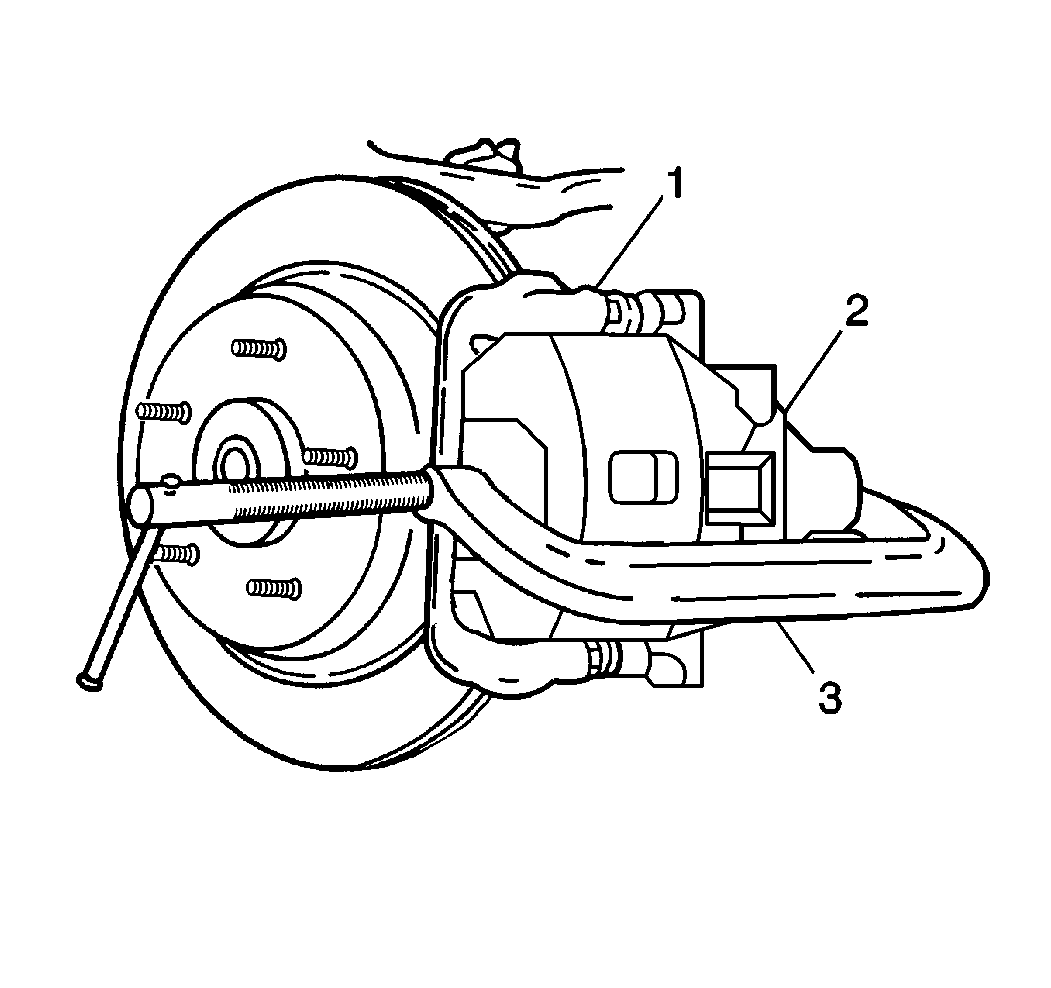
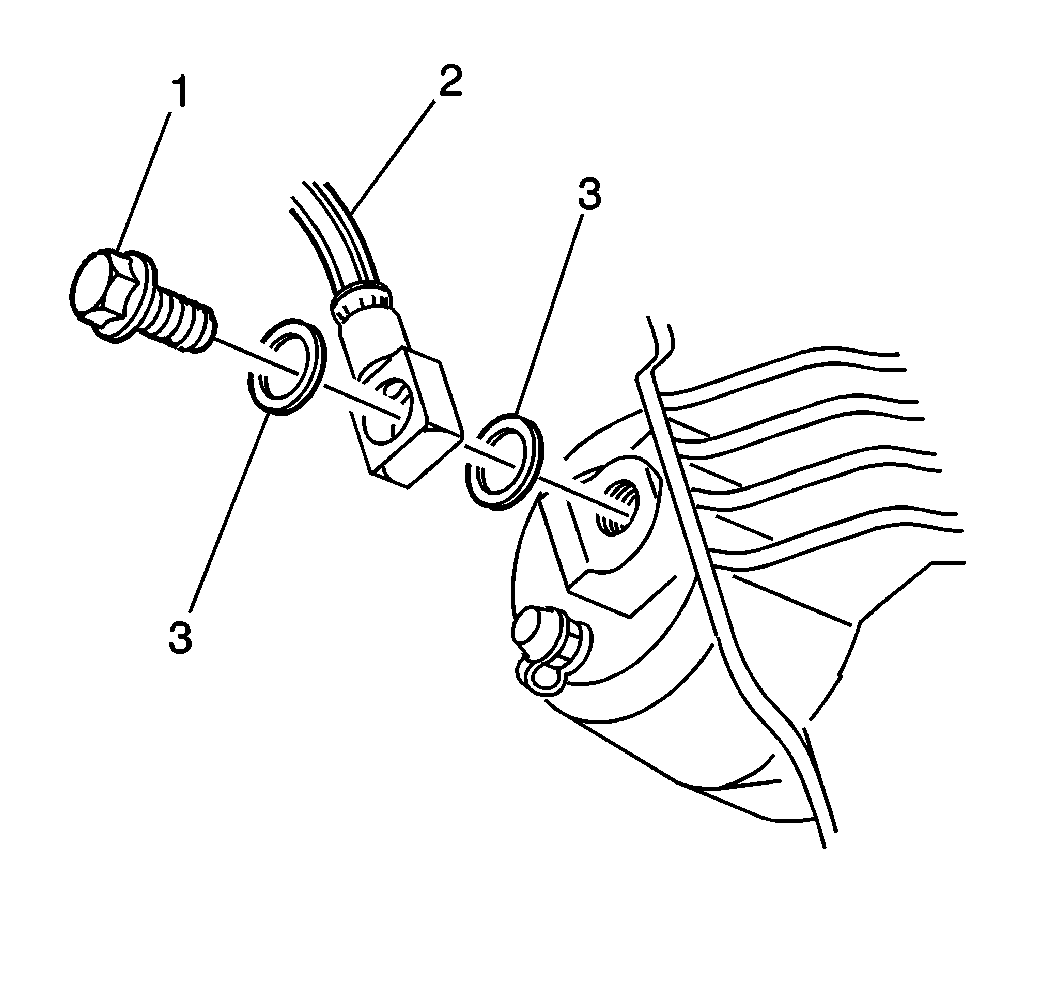
Discard the 2 copper brake hose gaskets (3). These gaskets may be stuck to the brake caliper and/or the brake hose end.
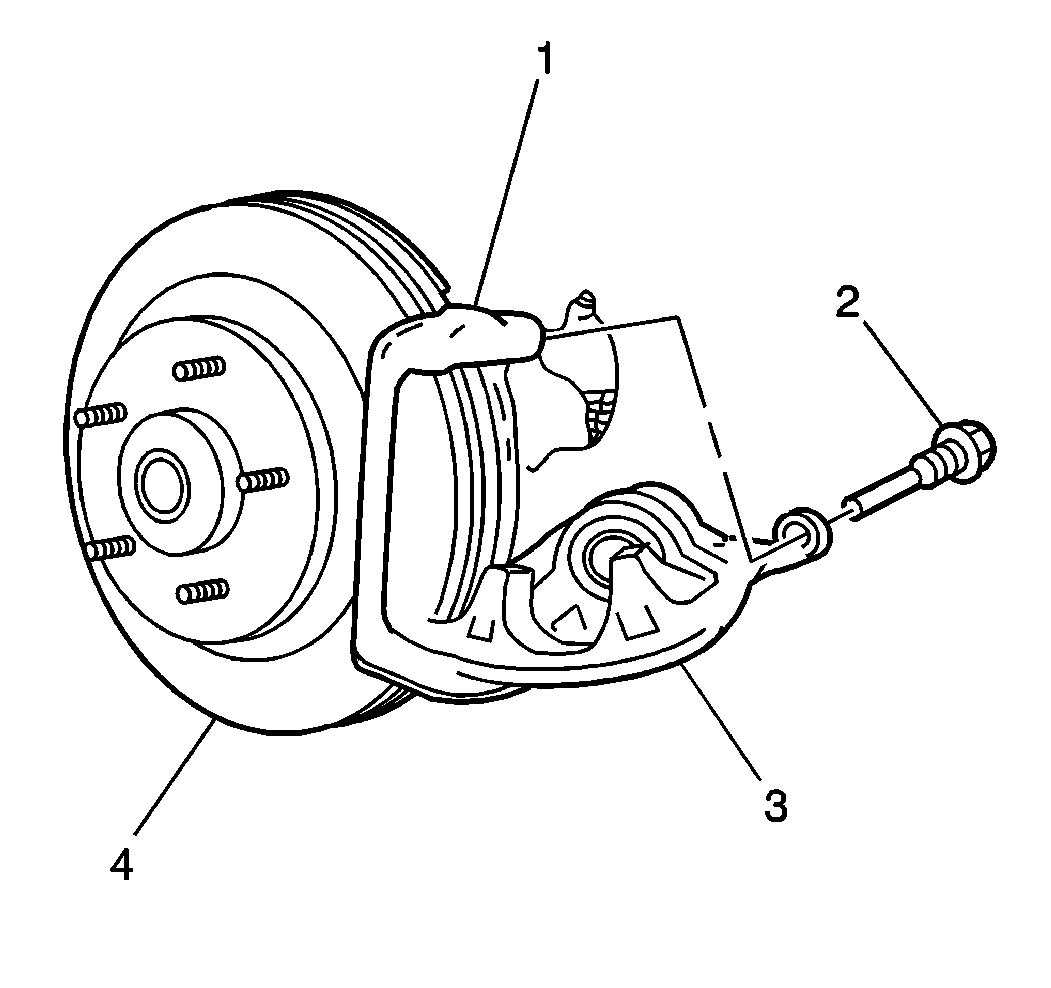
| • | Cuts |
| • | Tears |
| • | Deterioration |
| • | Replace any damaged caliper bracket bolt boots. Refer to Rear Disc Brake Hardware Replacement . |
Installation Procedure
- Install the caliper (3) over the rotor (4) and the caliper bracket (1). Ensure that the bushings are in place.
- Lubricate the caliper bolts (1 and 3). Use silicone grease. Do not lubricate the threads.
- Lubricate the 2 bolt boots (13 and 4) in the caliper bracket (12). Use silicone grease.
- Install the caliper bolts (1 and 3). Ensure that the bolt boots fit securely in the groove of the caliper bolts. Be sure not to pinch or tear the boots. If the boots are damaged, they must be replaced.
- Assemble the brake hose bolt (1) and the NEW copper brake hose gaskets (3) to the brake hose (2).
- Install the brake hose-to-caliper bolt to the brake caliper.
- Remove the 2 wheel lug nuts retaining the rotor to the hub.
- Install the rear tire and the wheel assembly. Refer to Tire and Wheel Removal and Installation .
- Lower the vehicle.
- Fill the master cylinder to the proper level with clean brake fluid. Refer to Master Cylinder Reservoir Filling .
- Bleed the brake system. Refer to Hydraulic Brake System Bleeding .
- Inspect the hydraulic brake system for brake fluid leaks.

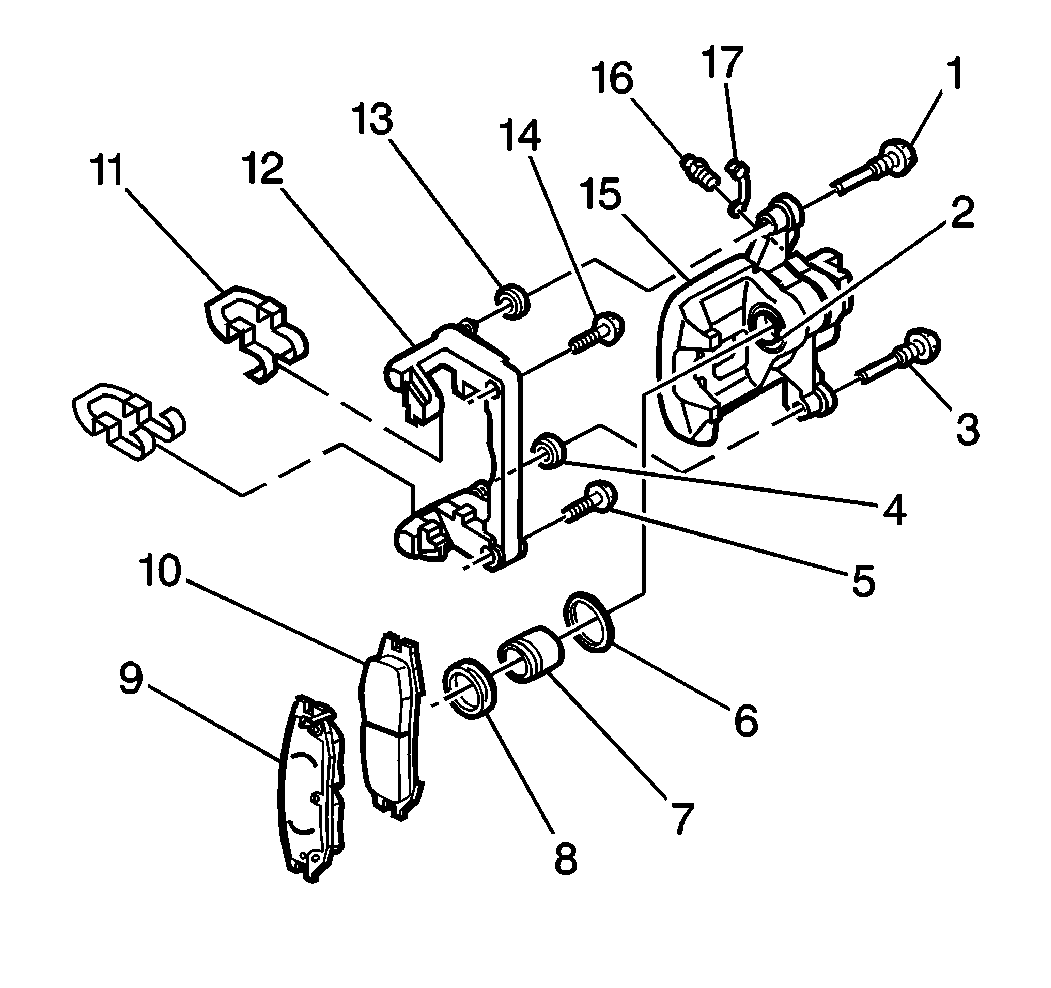
Notice: Refer to Fastener Notice in the Preface section.
Tighten
Tighten the bolts to 44 N·m (32 lb ft).

Important: Install NEW copper gaskets.
Tighten
Tighten the bolt to 54 N·m (40 lb ft).
Rear Brake Caliper Replacement J65
Caution: Refer to Brake Dust Caution in the Preface section.
Caution: Refer to Brake Fluid Irritant Caution in the Preface section.
Removal Procedure
- Inspect the fluid level in the brake master cylinder reservoir.
- If the brake fluid level is midway between the maximum-full point and the minimum allowable level, no brake fluid needs to be removed from the reservoir before proceeding.
- If the brake fluid level is higher than midway between the maximum-full point and the minimum allowable level, remove brake fluid to the midway point before proceeding.
- Raise and support the vehicle. Refer to Lifting and Jacking the Vehicle.
- Remove the tire and wheel assembly. Refer to Tire and Wheel Removal and Installation.
- Release the park brake cable tension at the equalizer.
- Disconnect the front and rear cables at the connector clip (2).
- Disconnect the park brake cable from the park brake lever on the brake caliper.
- Remove the park brake cable from the caliper bracket.
- Remove brake hose to caliper bolt.
- Remove the brake hose from the brake caliper.
- Remove and discard the 2 copper brake hose gaskets.
- Plug the opening in the brake caliper and brake hose to prevent fluid loss contamination.
- Remove the brake caliper bolts.
- Remove the brake caliper.
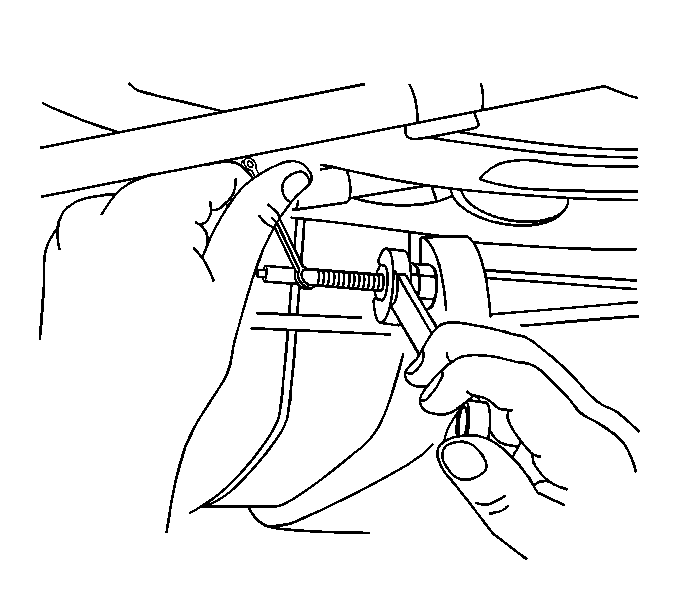
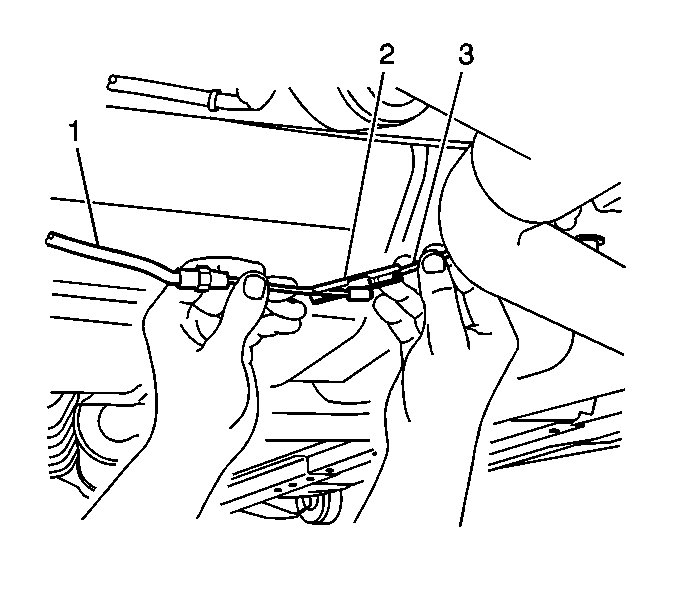
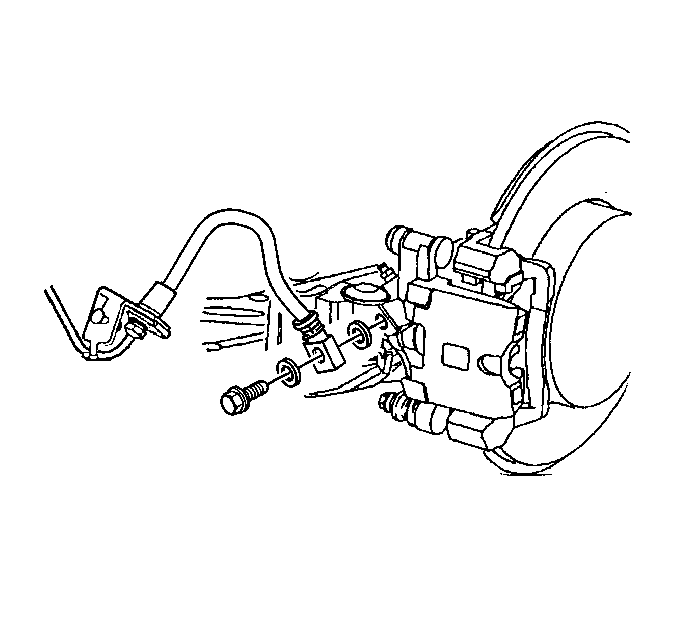
Installation Procedure
- Align the indents on the piston face (2) to match the pin on the brake pad.
- Inspect the bracket bolt guide assembly. Refer to Rear Disc Brake Hardware Replacement.
- Inspect the brake pad hardware and replace if necessary.
- Install the brake caliper (1) onto the caliper bracket insuring that the guide boots are not damaged.
- Install the brake caliper bolts.
- Assemble the brake hose bolt and the NEW copper brake hose gaskets to the brake hose.
- Install the brake hose to caliper bolt to the brake caliper.
- Install the park brake cable into the park brake bracket on the caliper.
- Connect the park brake cable to the park brake lever on the brake caliper.
- Bleed the hydraulic brake system. Refer to Hydraulic Brake System Bleeding.
- With the engine OFF, gradually apply the brake pedal to approximately 2/3 of its travel distance.
- Slowly release the brake pedal.
- Wait 15 seconds, then repeat steps 11-12 until a firm brake pedal is obtained. This will properly seat the brake caliper pistons and brake pads.
- Adjust the park brake system. Refer to Park Brake Adjustment.
- Install the tire and wheel assembly. Refer to Tire and Wheel Removal and Installation.
- Lower the vehicle.
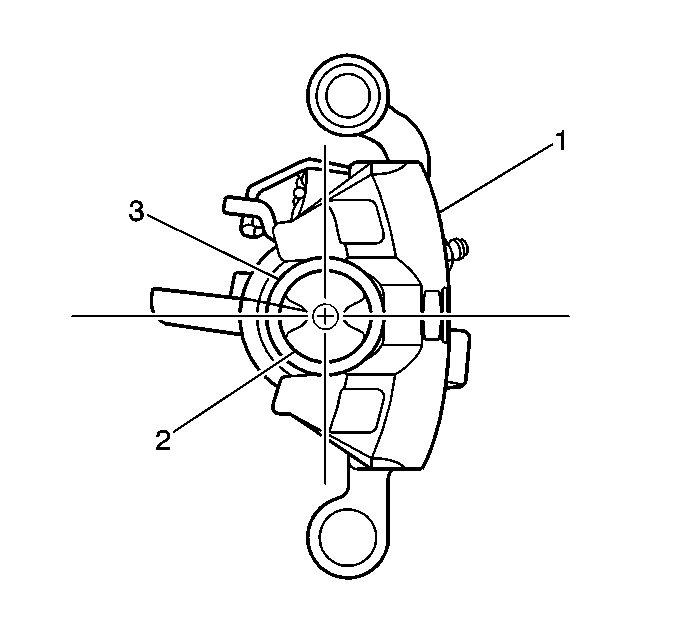
Notice: Refer to Fastener Notice in the Preface section.
Tighten
Tighten the brake caliper bolts to 34 N·m (25 lb ft).
Important: Install NEW copper brake hose gaskets.

When installing the right rear brake hose to caliper, hold hose up while tightening.
Tighten
Tighten the brake hose to caliper bolt to 54 N·m (40 lb ft).

